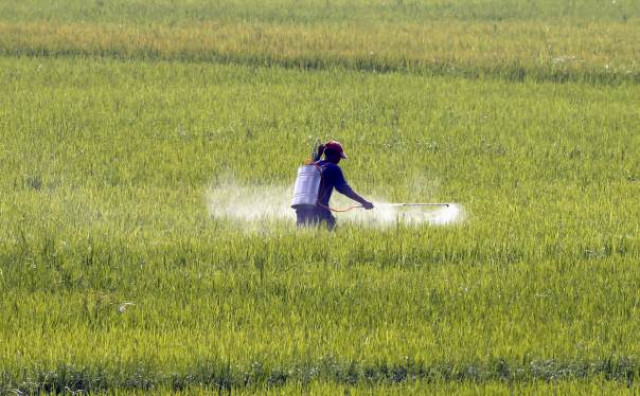PTI govt asked to reduce imbalance in GST on fertiliser
Fertiliser industry says GST refund on urea has reached Rs21.18b

A farmer sprays liquified fertiliser over a rice field. PHOTO: REUTERS
Urea is produced out of natural gas and when companies buy gas they pay two kinds of GST - 5% on feed gas and 17% on fuel gas. At present, the fertiliser companies are paying GST of Rs109 on the input of every bag of urea while they collect only Rs35 from consumers, which results in an imbalance of Rs74. They say the price of a urea bag is Rs1,830, on which the companies only recover 2% while the rest is left to be financed by government subsidy.
“Companies always pass the GST on to consumers,” said Shankar Talreja, an analyst at Topline Research. “In the case of fertiliser, the government gives subsidy to fill the gap, but it has not been paying the difference, which has piled up to billions.” “The accumulation of refundable GST on urea has reached Rs21.18 billion,” said the Fertiliser Manufacturers of Pakistan Advisory Council (FMPAC).
“The settlement of outstanding tax refunds of the fertiliser industry should be expedited to address the cash flow challenges,” read the budget proposals prepared by the FMPAC. “The fertiliser sector should be placed in the list of top priority industries, alongside exporters, for receiving sales tax refund given its key role in developing the agricultural economy,” it suggested.
For di-ammonium phosphate (DAP), the local manufacturers are paying input GST of Rs209 per bag against Rs70 (2%) as output GST, which results in a mismatch of Rs139.
“For all fertiliser products, GST on all industrial inputs including (but not limited to) feed and fuel gas should be reduced to zero with no revenue loss to the government,” FMPAC demanded in the budget proposals.
Fertiliser manufacturers want to see a decrease in the gas infrastructure development cess (GIDC), the case for which has been filed in court.
Published in The Express Tribune, May 26th, 2019.
Like Business on Facebook, follow @TribuneBiz on Twitter to stay informed and join in the conversation.



















COMMENTS
Comments are moderated and generally will be posted if they are on-topic and not abusive.
For more information, please see our Comments FAQ